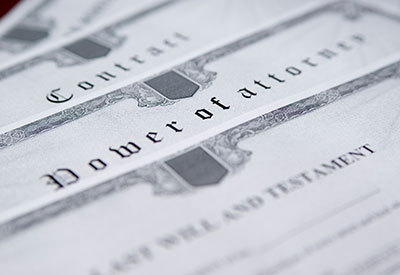Family drama, ethical dilemmas, feelings of grief and rejection — these weighty issues probably don’t come to mind when you think about estate planning. Yet, they are pivotal themes explored in the hit TV series “Better Call Saul.” This acclaimed prequel to “Breaking Bad,” which concluded in 2022 after six seasons and is available on streaming networks, offers an intricate look into the world of a shady lawyer where complex legal battles intertwine with raw human emotions.
At first glance, a show about the questionable exploits of an attorney dabbling in criminality seems far removed from the dry realm of wills and trusts. However, amidst the exaggeration and artistic license lies poignant commentary on real-world complexities surrounding estates. The show’s central character, Jimmy McGill, and his turbulent tale highlights crucial planning considerations including asset distribution wishes, powers of attorney, business succession and the profound emotional aftermath estate matters trigger. His transformation into the infamous Saul Goodman serves as a cautionary reminder of how lapses in diligence and ethics can fuel conflict and lead to major repercussions.
While scenes depicting dramatic family disputes or ethically ambiguous legal maneuvers make for enthralling TV drama, they underscore issues people contend with daily when planning how to pass on their legacy. Examining pivotal “Better Call Saul” plotlines provides an insightful examination into multifaceted estate planning challenges. The show makes these weighty matters more engaging and accessible through well-crafted characters like the McGill brothers. Ultimately, it emphasizes how at its core, estate planning affects not just asset allocation but people and relationships.
The importance of wills and trusts
A major arc in Season 1 involves Jimmy helping seniors update their estate planning documents. He meets clients who have outdated or incomplete wills and trusts that no longer reflect their wishes on heirlooms and property distribution. This storyline highlights how important it is to update estate planning documents as life situations change with marriage, divorce, death of beneficiaries or acquisition of new assets. Updating estate planning documents as life situations change is critically important for several reasons that include:
- Reflecting current asset distribution wishes. Estate plans made years ago likely do not reflect your current wishes on distributing your assets and personal possessions. As you accumulate more assets over time – houses, savings, investments – you may want to change how these get allocated to heirs in your will or trust. Divorce or death of originally named beneficiaries also necessitates updates to ensure assets go where you now desire. Without updates, assets may get distributed in ways you did not intend.
- Avoiding family disputes. Outdated estate documents are a prime cause of bitter disputes among grieving family members. Say you meant to update your will to include a newer spouse but never got around to it – this can fuel conflict with children from a previous marriage. Clear, updated documentation of intended heir distribution can significantly mitigate potential family disputes later.
- Accounting for tax law changes. Estate tax exemption limits and laws change over time. What was in place when you first did estate planning may be outdated and lead to unintended tax consequences now. Plus, you may be subject to different state estate taxes if you moved states. Updating for current laws can better optimize tax planning.
- Specifying care for digital assets. Something most older estate plans did not address are all the digital assets we have now – email accounts, social media, online financial accounts and more. Without clear legal specification in updated documents, it can be difficult for heirs to access these assets.
The family dynamics of estate settlement
Throughout the show, estate matters trigger major family drama: from Chuck and Jimmy McGill’s troublesome relationship to gang member Krazy-8 having to hide money from his law-abiding family. These stories reveal how estate administration after someone dies can surface and magnify festering family conflicts. It highlights the need for clear estate and succession planning to mitigate disputes.

While “Better Call Saul’s” twisted legal cases are enthralling TV drama, the estate planning scenarios closely reflect real-world complexities. By examining the show’s themes around wills, elder care, digital assets and family dynamics, viewers can gain valuable lessons to inform and improve their own estate planning.
In "Better Call Saul," the storyline involving the character of Jimmy's estranged brother Chuck McGill highlights the significance of a will. Chuck has a detailed will that becomes a point of contention after his death.
Throughout the series, Jimmy goes through a transformative journey, both personally and professionally. A poignant moment in this journey is when Jimmy learns about his inheritance from Chuck. Jimmy and Chuck share a complicated and strained relationship. Chuck, as a highly respected lawyer, often looks down on Jimmy, considering him to be a lesser attorney prone to unethical practices. This dynamic deeply affects Jimmy, who simultaneously admires and resents his brother.
Prior to the inheritance scene, Chuck, suffering from a mental condition that makes him hypersensitive to electromagnetic fields, tragically dies in a house fire, which is heavily implied to be suicide. His death profoundly impacts Jimmy and the series’ narrative.
The scene in question occurs during the reading of Chuck's will. This is a crucial moment for Jimmy, as he is eager to learn what his brother, who had always been critical of him, left for him, if anything.
Jimmy is left a sum of $5,000, which is strategically significant. In the context of estate law, this amount is often given to discourage someone from contesting a will, as it shows they were not forgotten, but deliberately left a nominal amount. This revelation is a stark reminder to Jimmy of his brother's low regard for him.
The scene is emotionally charged, highlighting Jimmy's complex feelings of grief, anger and rejection. It serves as a pivotal moment in Jimmy's transformation into Saul Goodman.
The inheritance acts as a final commentary from Chuck on their relationship. It symbolizes Chuck's final judgment of Jimmy, reinforcing the notion that Chuck never truly believed in or respected Jimmy.
Jimmy's reaction to the inheritance is critical in understanding his character's evolution. Instead of showing overt sadness or anger, Jimmy displays a mix of resignation and a complex, unresolved emotional response toward his brother's final act.
This moment is instrumental in propelling the plot forward, particularly in how Jimmy continues to grapple with his identity, ethics and his journey toward becoming the ethically challenged defense attorney Saul Goodman.
The scene where Jimmy McGill learns about his $5,000 inheritance from Chuck is more than just a plot point. It encapsulates the essence of their fraught relationship, serving as a catalyst for Jimmy's continued evolution and setting the stage for his future choices and transformation in "Better Call Saul." This scenario underscores the importance of having a clear and legally binding will to ensure that one's assets are distributed as intended, thereby minimizing disputes among beneficiaries.
The nominal inheritance: balancing legal strategy and emotional fallout

In the realm of estate planning, the allocation of a nominal inheritance has emerged as a strategic tool to deter beneficiaries from contesting a will. However, this approach, while legally sound, can also ignite complex emotional reactions such as grief, anger and a sense of rejection among the recipients and as exemplified in “Better Call Saul.”
Legal perspective: deterrence against will contests
A nominal inheritance, often a token amount, is deliberately included in a will to demonstrate that the testator (the person making the will) has not overlooked or forgotten a potential beneficiary. This tactic is used to counter potential legal claims that the omission was accidental, which is a common ground for contesting wills.
Some wills include a no-contest clause, which stipulates that a beneficiary who challenges the will and loses may forfeit their inheritance. A nominal inheritance can make this clause more enforceable, as it provides the beneficiary with something to lose, albeit small.
Receiving a nominal inheritance often makes it more challenging for a beneficiary to contest the will. The presence of their name and a designated share, however small, indicates the testator's intentional decision, making it harder to argue for a larger share.
For many, however, an inheritance is not just about financial gain but a symbolic last connection to the deceased. A nominal inheritance can feel like a final rejection, exacerbating the natural grief associated with loss.
Beneficiaries might perceive a nominal inheritance as a deliberate insult or a final act of spite, leading to intense feelings of anger and betrayal. This is particularly true in families, such as with the fictional McGill brothers, where the dynamics were already strained.
A minimal inheritance can trigger deep feelings of unworthiness or rejection, especially if other beneficiaries receive significantly more. This disparity can lead to long-lasting impacts on self-esteem and self-perception.
Navigating the emotional and legal terrain
Communication is key. Open and honest communication about estate planning decisions can alleviate potential misunderstandings and hurt feelings. Explaining the reasons behind a nominal inheritance can sometimes soften its emotional impact.
Estate planners and attorneys can provide valuable guidance on how to structure a will in a way that minimizes legal challenges while also considering the emotional well-being of the beneficiaries.
Other estate planning themes in “Better Call Saul”

The acclaimed TV series also touches on powers of attorney (PoA). This legal document allows a person (the principal) to appoint someone else (the agent or attorney-in-fact) to make decisions on their behalf. This theme becomes prominent when Jimmy takes on elder law and helps retirees with their estate planning. The misuse or misunderstanding of powers of attrney is a recurring theme that leads to various legal and ethical dilemmas, reflecting the complex nature of this legal instrument in real life.
One of the most significant instances of PoA misuse in “Better Call Saul” involves Jimmy taking advantage of elderly clients. Although he initially starts working in elder law with seemingly good intentions, his actions gradually become more questionable. He uses his position to gain the trust of senior citizens, subsequently convincing them to grant him PoA. This situation highlights the ethical dilemma in which a lawyer might exploit the vulnerability of clients, particularly seniors, for personal gain.
The series also depicts scenarios where Jimmy is seen manipulating clients into signing PoAs or other legal documents. These actions border on coercion, as Jimmy often doesn't fully explain the implications of these documents to his clients. This manipulation represents a significant ethical breach, as it compromises the informed consent that is foundational to any attorney-client relationship.
A major plotline in “Better Call Saul” revolves around a class-action lawsuit against the Sandpiper Crossing retirement home. Jimmy discovers that the facility is overcharging its residents, and he uses the PoAs he has obtained to access their financial records. These scenes highlight both the potential investigative utility and the ethical complexities of PoA in legal cases involving vulnerable groups like the elderly.
Jimmy’s handling of PoA frequently blurs the line between advocating for his clients’ best interests and pursuing his own agenda. This conflict of interest is a central ethical dilemma in the series. As a lawyer, Jimmy is expected to prioritize his clients' needs, but his actions often suggest otherwise, raising questions about the ethical responsibilities of legal professionals.
The misuse of PoA in “Better Call Saul” doesn't go unnoticed. It leads to legal battles, professional scrutiny and personal fallout for Jimmy. These consequences illustrate the legal risks associated with the improper handling of PoA and the importance of adhering to legal and ethical standards in the practice of law.
Conclusion
In summary, the TV series “Better Call Saul” utilizes its central character Jimmy McGill’s journey to highlight pertinent estate planning considerations. Through pivotal scenes like Jimmy discovering the terms of Chuck’s will and the nominal $5,000 inheritance left to him, the show underscores complex dynamics involving estates.
Beyond legal implications, the show poignantly depicts the profound emotional aftermath estate planning can spur. Feelings of grief, anger, rejection and betrayal often accompany inheritances, especially nominal ones which may seem like deliberate insults.
Finally, “Better Call Saul” reminds us that estate planning impacts far more than asset distribution. Business succession considerations, family conflicts, reputational damages from ethical breaches — these repercussions underline why estate planning warrants meticulous care and forethought.
Through the lens of its central characters, “Better Call Saul” provides an insightful examination of multifaceted estate planning issues. The show’s dramatic depictions make these matters more engaging and accessible to the general public. Ultimately, it emphasizes how estate planning is fundamentally about people as much as property or assets.



